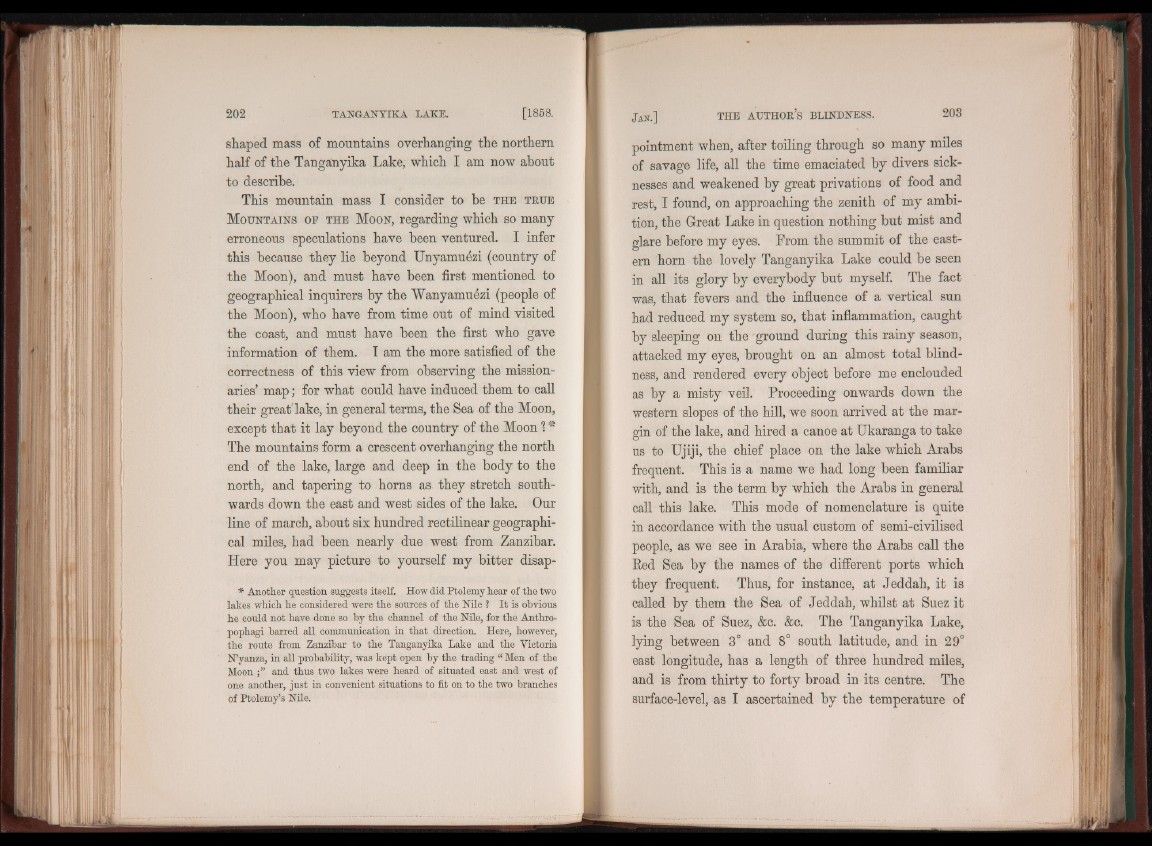
shaped mass of mountains overhanging the northern
half of the Tanganyika Lake, which I am now about
to describe.
This mountain mass I consider to be th e true
M ountains op th e M oon, regarding which so many
erroneous speculations have been ventured. I infer
this because they lie beyond Unyamuezi (country of
the Moon), and must have been first mentioned to
geographical inquirers by the Wanyamuezi (people of
the Moon), who have from time out of mind visited
the coast, and must have been the first who gave
information of them. I am the more satisfied of the
correctness of this view from observing the missionaries’
map; for what could have induced them to call
their great lake, in general terms, the Sea of the Moon,
except that it lay beyond the country of the Moon % f
The mountains form a crescent overhanging the north
end of the lake, large and deep in the body to the
north, and tapering to horns as they stretch southwards
down the east and west sides of the lake. Our
line of march, about six hundred rectilinear geographical
miles, had been nearly due west from Zanzibar.
Here you may picture to yourself my bitter disap*
Another question suggests itself. How did Ptolemy hear of the two
lakes which he considered were the sources of the Nile ? It is obvious
he could not have done so by the channel of the Nile, for the Anthropophagi
barred all communication in that direction. Here, however,
the route from Zanzibar to the Tanganyika Lake and the Victoria
N’yanza, in all probability, was kept open by the trading “ Men of the
Moon and thus two lakes were heard of situated east and west of
one another, just in convenient situations to fit on to the two branches
of Ptolemy’s Nile.
pointment when, after toiling tbrougb so many miles
of savage life, all the time emaciated by divers sicknesses
and weakened by great privations of food and
rest, I found, on approaching the zenith of my ambition,
the Great Lake in question nothing but mist and
glare before my eyes. From the summit of the eastern
horn the lovely Tanganyika Lake could be seen
in all its glory by everybody but myself. The fact
was, that fevers and the influence of a vertical sun
had reduced my system so, that inflammation, caught
by sleeping on the ground during this rainy season,
attacked my eyes, brought on an almost total blindness,
and rendered every object before me enclouded
as by a misty veil. Proceeding onwards down the
western slopes of the hill, we soon arrived at the margin
of the lake, and hired a canoe at Ukaranga to take
us to Ujiji, the chief place on the lake which Arabs
frequent. This is a name we had long been familiar
with, and is the term by which the Arabs in general
call this lake. This mode of nomenclature is quite
in accordance with the usual custom of semi-civilised
people, as we see in Arabia, where the Arabs call the
Red Sea by the names of the different ports which
they frequent. Thus, for instance, at Jeddah, it is
called by them the Sea of Jeddah, whilst at Suez it
is the Sea of Suez, &c. &c. The Tanganyika Lake,
lying between 3° and 8° south latitude, and in 29°
east longitude, has a length of three hundred miles,
and is from thirty to forty broad in its centre. The
surface-level, as I ascertained by the temperature of